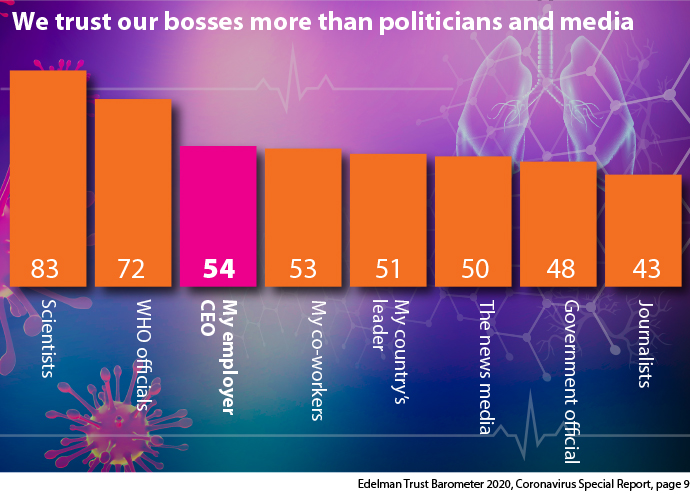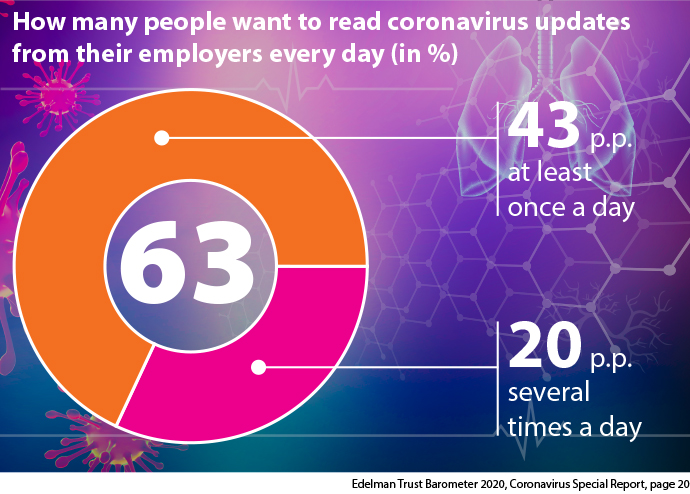
Coronavirus pandemic is a hard time for internal and external business communication. It’s like, how do you talk about coronavirus, if you had always tried to be positive in your messages? Are you to deny the situation? What do you tell your employees if you can’t be sure of anything yourself? Do you tell them about the support you donated to a local hospital, or would they accuse you of promoting on the wave of a global crisis? And so on… When there’s some cost-cutting and opportunity-waiving incoming, one could actually feel like not communicating anything… (And what could shed some light on comms industry’s current mood? I think some of the questions asked by Szymon Sikorski, head of Publicon agency, in his survey, might be on point: “By what amount did the pandemic limit marketing/communication expenses in your company? Do you plan employment reductions/layoffs?”)
Still, many companies continue to communicate. As I was reading tens of corporate messages about coronavirus, I started to wonder why do companies try to walk in news media’s shoes? Why do they feel the need to provide information that can easily be found on government websites? What makes them play the role of a news agency that simultaneously reassures that “together we will survive”?
The answer may come from a study carried out by the Edelman agency. Special issue of coronavirus pandemic “Trust Barometer” suggests that some consumers simply expect companies to inform about the situation. Edelman studies have shown for a while already that business is a more reliable source of information than some of the media and politicians, and the current situation is only confirming that. 54% of the respondents would trust their manager’s message about coronavirus – that’s by 6 p.p. more than in the case of government representatives, and by as much as 11 p.p. more than in the case of journalists.

What kind of messages do people expect from their employers? First, they want details on where you can get tested (51% responds) and which countries it is forbidden to travel to (45%). The respondents are also interested e.g. in the latest statistics regarding coronavirus spread (43%) and news on the development of a vaccine (40%). How often do they want to receive such news? Most of them – even every day.

Although it seemed counterintuitive to me at first – after all I draw information about the world from the media – I understood it at some point. We spend with our employers dozens of hours every week and they help us make money. But employers could have not only some expectations towards us, but also – some responsibilities. Having that in mind, we could be close to establishing trust also in the infosphere.
Supporting internal communication of large employers, AUDE helps them almost every day to write, explain and develop graphics for more and more news about coronavirus. I can watch how messages are made about things that really matter to people: child care allowances, aid programs or personal hygiene at work. Open rates of more than 90% are proof how new information is important to people.
There is the other side of the coin, however: with all that coronavirus news around, it can cause anxiety and stress in people. The news experience of working remotely does not make it easier either. But there is another area where employers can be more successful than media. It is because business has a unique possibility to provide people with basic, easily accessible and relevant advice on psychological health, rest and wellbeing.
Many of our customers are launching special helplines and provide free medical consultancy. They try to give their employees a bit of rest from all the alarming headlines. And that’s no surprise – after all, who is going to work if we all feel unwell?
>> No one could have predicted coronavirus? But Bill Gates did… at least so the online legend has it (“USA Today”)
Kategorie: school of contentic, B2E